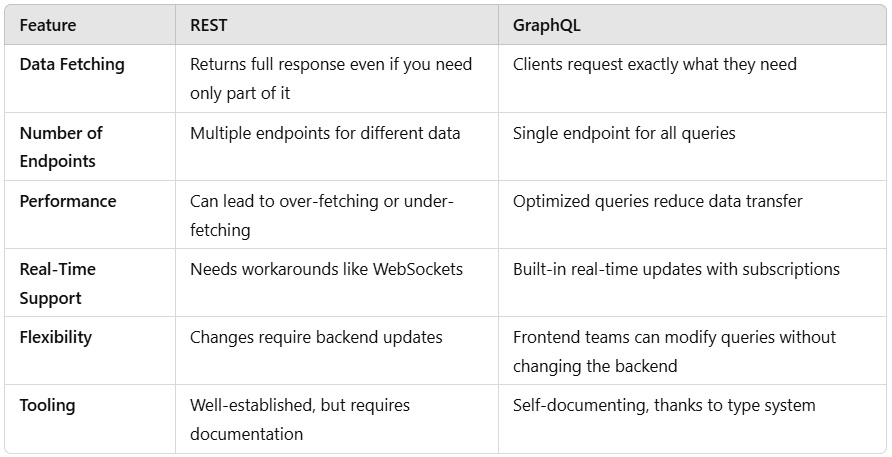Why More Developers Are Choosing GraphQL Over REST APIs
For years, REST APIs were the gold standard in web development. They powered everything from social media apps to enterprise platforms, providing a reliable way to exchange data between clients and servers. But times are changing.
🚀 GraphQL is quickly becoming the go-to choice for modern developers and companies looking for faster, more flexible, and more efficient APIs.
So, what’s behind this shift? Why are developers moving away from REST and embracing GraphQL? And, more importantly, should your company follow suit?
As a leading platform for hiring top remote developers, Remoteplatz helps businesses stay ahead of tech trends—including API choices. In this blog, we’ll break down why GraphQL is winning over developers, how it compares to REST, and whether it’s the right choice for your next project.
🔍 What is GraphQL (and How is it Different from REST)?
Before we dive into why GraphQL is gaining traction, let’s define it:
REST APIs work by exposing fixed endpoints (e.g., /users, /products, /orders) that return predefined data structures.
GraphQL, on the other hand, allows clients to request exactly the data they need, all from a single endpoint. Instead of multiple requests to different endpoints, you can fetch all required data in one query.
🛠 Quick Comparison: GraphQL vs. REST

💡 7 Reasons Why Developers Prefer GraphQL Over REST
1️⃣ No More Over-Fetching or Under-Fetching
One of the biggest pain points in REST APIs is over-fetching and under-fetching data.
🚨 Over-fetching: A REST API might return more data than needed, increasing bandwidth usage.
🚨 Under-fetching: If an API doesn’t provide enough data in one request, the client has to make multiple API calls, slowing down performance.
✅ GraphQL solves both problems by letting clients request only the data they need—nothing more, nothing less.
🔹 Example: A mobile app wants to show a user’s name and email.
- REST API: Fetches the entire user object (
id, name, email, address, phone, profile picture, etc.) - GraphQL: Requests only
{ name, email }, reducing unnecessary data transfer.
👉 For companies using remote developers, this means faster apps, lower costs, and better performance.
2️⃣ One API Endpoint for Everything
With REST, developers need multiple endpoints for different resources:
/usersto get user data/ordersto fetch order history/productsfor product details
🚀 GraphQL simplifies this with a single endpoint, making API management much cleaner.
✅ Why developers love this:
- Easier API maintenance – No need to create new endpoints for every feature.
- Less backend complexity – Backend teams focus on data logic, not routing requests.
- Frontend teams have more control – They can decide what data they need without waiting for backend updates.
👉 Remoteplatz developers use GraphQL to build scalable and maintainable APIs for businesses worldwide.
3️⃣ Faster Development with Self-Documenting APIs
REST APIs require manual documentation (Swagger, Postman, etc.), which can quickly become outdated.
GraphQL automatically generates documentation based on its schema, so developers can explore and test APIs in real time.
✅ Why this matters:
- Less time wasted on API docs
- Easier onboarding for new developers
- More productive development teams
👉 Hiring remote developers? Remoteplatz ensures you get GraphQL experts who can build self-documenting APIs for your business.
4️⃣ Real-Time Data with Subscriptions
Modern apps need real-time updates (think stock prices, live chat, notifications).
With REST, real-time functionality requires:
- Polling (frequent API requests, high server load)
- WebSockets (complex implementation)
🚀 GraphQL makes real-time data easy with subscriptions, allowing clients to receive automatic updates when data changes.
✅ What this means for businesses:
- More engaging user experiences
- Lower server load than polling
- Easier implementation than REST
👉 Remoteplatz developers specialize in real-time applications using GraphQL to power next-gen digital products.
5️⃣ Strongly Typed Schema for Fewer Bugs
One of GraphQL’s standout features is its strict type system.
🔹 In REST, clients often guess what data to expect—leading to bugs and inconsistencies.
🔹 In GraphQL, the API defines exactly what data types are available (String, Int, Boolean, Object, etc.), preventing errors.
✅ Why this is a game-changer:
- Fewer runtime errors
- Better API consistency
- More reliable integrations
👉 This is why Remoteplatz developers prefer GraphQL—it ensures API stability and reduces debugging time.
6️⃣ Backend & Frontend Teams Work More Independently
REST APIs often slow down development because backend and frontend teams must coordinate changes.
🔹 Example: A frontend developer needs a new data field. With REST, they must:
- Request backend updates
- Wait for deployment
- Modify the frontend code
🚀 With GraphQL, the frontend can request new fields without backend changes!
✅ What this means for companies:
- Faster feature rollouts
- Less dependency between teams
- More agile development cycles
👉 Remoteplatz developers use GraphQL to help companies scale without bottlenecks.
7️⃣ Easier API Versioning & Evolution
REST APIs often require new versions (v1, v2, v3) when making changes—leading to:
❌ Complicated migrations
❌ Multiple versions running at once
❌ Backward compatibility issues
🚀 GraphQL eliminates versioning problems because clients specify exactly what data they need. New fields can be added without breaking existing queries.
✅ Why businesses love this:
- Less technical debt
- Easier to introduce new features
- Longer API lifespan
👉 At Remoteplatz, we build GraphQL APIs that are future-proof and adaptable.
🚀 Should Your Business Switch to GraphQL?
✅ Choose GraphQL if:
✔ You need a flexible, scalable API for web and mobile apps
✔ You want to improve performance and reduce bandwidth costs
✔ Your frontend and backend teams work independently
✔ You require real-time updates
❌ Stick with REST if:
- You have simple, small-scale applications
- Your team is already heavily invested in REST
🚀 Looking for GraphQL developers? Remoteplatz connects companies with expert remote GraphQL developers who can build fast, scalable, and future-ready APIs.
👉 Hire top remote developers today at Remoteplatz.com
